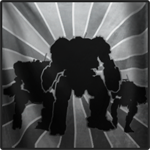Sorry, long post. Tire, and I may have rambled a little...

 Lord Scarlett Johan, on 31 December 2015 - 01:29 AM, said:
Lord Scarlett Johan, on 31 December 2015 - 01:29 AM, said:
Wat?
You missed the mark.
Liao and Marik have an alliance? Having one planet to contest over instead of two doesn't change diddly. They still have a Non-aggression pact. Instead of currently having to two planets against Davion, two against Steiner, and two against Liao, they now have three total instead of six: one against Steiner, one against Liao, and one against Davion; literally consolidating the queues.
Either way, the voting system or reducing the number of available targets would work in consolidating the queues. And that's what's needed at the moment.
Ummm... Not really?
You were talking about a rotational attack path, where each attack phase (whatever given length of time) would be on a rotation, so one moment you could be (in Marik's example) attacking Davion/defending Steiner, then next phase Liao/Steiner, then Steiner/Davion, then back to Davion/Liao... With no control. This leaves the Merc and Loyalist at the same level still.
The Voting system PGI is contemplating (from what I've grasped of it) would be limiting attack lanes in a far more reasonable (and Loyalist controlled) manner, thus giving a reason to be a Loyalist over a Merc, and giving reason for sticking with a faction over time. It could be limiting each faction to a single attack lane at a given time (or more if required).
And yes, Marik and Liao have had a long standing alliance in CW since practically it's start. It appears as though recently that may be getting called off by Liao, but I'm not sure how that situation has been progressing as of the last few days. If we Loyalists could control where our faction attacked, I'm certain Marik would not be choosing Liao, and instead be targeting Davion. It would also inform us (Marik) if Liao actually did have hostile intent against us with their declared attack lane, or if it's a rouge unit/merc trying to kick some dust around (who with a Loyalist vote system, wouldn't get an attack on us). (Some of us players actually enjoy this aspect of CW.)
As far as what I've read from your post, do you mean consolidated (not rotational) queues, where defense and offense are combined, and whomever wins takes the planet (preventing planet switching)? AKA: Instead of being able to attack X planet and defend Y planet, you just have an "Attack this faction" button, and whichever side wins the most territory takes a planet from the losing side? (Removing the Defense and Offense of specific planets, and turning it into a lump pool?)
This concept is vastly different from what you originally proposed. Either that or you didn't explain it very well... (Reminder quote inserted for reference.)
 Lord Scarlett Johan, on 30 December 2015 - 07:59 PM, said:
Lord Scarlett Johan, on 30 December 2015 - 07:59 PM, said:
Every faction has two planets with every adjacent faction, so FRR starts off with 8 total planets. One attack and one defend with each faction.
Simply putting planets on an attack/defend rotation with each faction would halve the buckets, consolidating players spread among 8 planets to 4. So FRR has one rotation of attack Steiner, defend from CW, attack CGB, defend from Kurita. Next rotation, defend from Steiner, attack CW, defend from CGB, attack Kurita.
Or do you mean it would rotate the attack and defend options against a faction? (I believe this is what you meant, rereading it, but the phrasing is a little hard to grasp.) One phase Steiner can attack Wolf, the next phase they would be defending against Wolf? If this is your proposition, I don't think it would be a very good idea. It does consolidate the queues, but people wish to continue pressing an offense when they have an advantage. I don't think this is a system that players are looking for, and it doesn't address the Merc and Loyalist issue many players want corrected.
People want more matches faster (consolidating queues achieves this goal, and your proposition would work here) and they also want rewards for sticking with a faction compared to "faction hopping". They want Loyalists to have some benefit, or have the ability to "control their mercs". CW Phase 1 showed a lot of this desire, especially as players organized themselves, their factions, and their factions allies. A lot of work went into that, and sometimes a random merc unit would pop in, attack a faction that was in an alliance, cause a bunch of "trouble" and then wonder off to the next faction afterwards. This was no fault of theirs, as it was what the system let them do.
After the first map reset, a lot of people lost interest in CW. Some of this was because of how the faction relations were handled, as in not touched (understandably so, considering how massive CW is as a project). Combine that with weeks/months of work coordinating attacks, taking planets, getting unit names on worlds, epic contests (Wazon comes to mind) between factions... and it all got "reset" (understandably so). It made players feel like their work was for nothing.
Giving Loyalists some aspect would help that. "Controlling Mercs" and making them feel different, and not having them determine the map is another often brought up subject. As other people have stated, giving meaning to taking a world (besides a unit tag) would be another good step (no concepts on what is expected here), Speeding up the queuing times would be another bonus.
Right now, we can address Three of these issues with one concept, if it's done right and everything is placed into consideration. We can address how Mercs and Loyalists relate, we can reduce the queue times by restricting the number of planets, and we can provide a reason for actually taking a Loyalist contract over a Merc. Your concept (which isn't necessarily a bad idea, mind), only addresses one of these issues currently.
CW is a large project. There are many facets to it, and a single problem is often times not one issue, but several issues compounded into a tangled knot. Sometimes, one needs to take a step back and make note of all the issues, and break it down into smaller categories that can be tackled together. No need to address each issue separately, when one solution can sometimes be created to address several issues at once.
 Lord Scarlett Johan, on 30 December 2015 - 07:52 PM, said:
Lord Scarlett Johan, on 30 December 2015 - 07:52 PM, said:





































